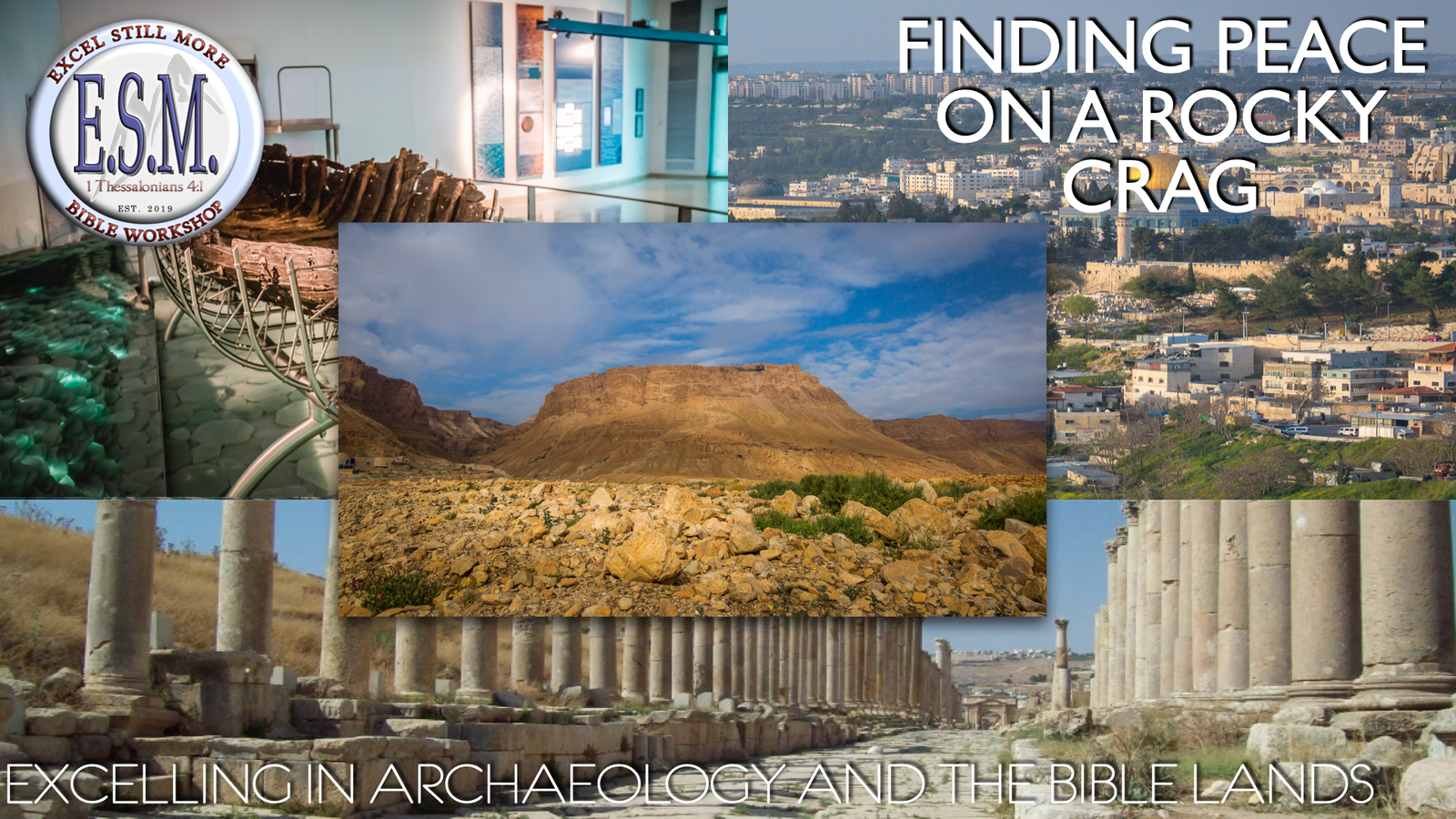After taking refuge in the cave of Adullam (1 Samuel 22:1), David soon found himself retreating to the refuge in the strongholds and hiding places of the Judean Wilderness. King Saul’s murderous jealousy drove David further and further away from the people he loved and sought to help (1 Samuel 22-24). Largely uninhabited, this barren territory is wedged between the Hill Country of Judah and the lifeless waters of the Dead
Sea. While little vegetation and water exist, the wilderness still has a redeeming value. Its deep ravines, major uplifts, and numerous caves provide many places—or strongholds—where one can hide while being pursued by an enemy.
The Hebrew word for Stronghold found in 1 Samuel 24:22 is mesudah and is often associated with “the top, peak of a mountain, a mountain castle, and a fortress or fastness.” To places like this, David would have come for security, peace, and protection. One of David’s strongholds was most likely the enormous escarpment known today as Masada National Park. The impressive natural land feature was the place where King
Herod built one of his palace fortresses in the first century B.C., which would have been an ideal hiding place for a small band of men led by King David and a strategic place for defense. It was also the place where David grew in faith and learned to depend on God.
On a rugged, isolated mountaintop in the wilderness and in the darkness of a cave, David not only grew in faith but also introduced the world to the greatest poetry ever composed. His time
of pain and retreat brought the world powerful and vivid imagery used throughout many biblical psalms. Those prayers and the symbolism they contain have helped many of us in our own times of wandering through a wilderness of despair. The imagery of a dark valley (Psalm 23), a rock badger (Psalm 104), a rocky crag (Psalm 18), and a dark cave (Psalm 57) were tools used in explaining more about the security and goodness of God. Understanding more about places like Masada and the wilderness where David fled can help us to understand better the peace and security found in God during our own times of walking in the wilderness of despair and loneliness. Traveling through the wilderness of hardship can help us to emerge as better people.
Today, when we encounter hardship in our lives, it can often feel as though we are traveling through a wilderness of despair, yet this troubling experience can actually be used as a means of growing closer to God. When we find
ourselves on a mountain of isolation or in the darkness of a cave,
we are often given the quiet time we need to reflect upon our relationship with God and to understand the things that are most important. Our desert experiences can often bring us to a place of emotional or spiritual poverty where we discover that God provides what we cannot produce on our own. We must remember His promise:
“He gives strength to the weary and increases the power of the weak. Even youths grow tired and weary, and young men stumble and fall, but those who hope in the LORD will renew their strength. They will soar on wings like eagles; they will run and not grow weary, they will walk and not be faint”…Isaiah 40:29-31
It is by means of weakness and through times of hardship that we are made strong (2 Corinthians 12:8-9). It is in the wilderness of hurt and harm that we can come to know the peace that passes all understanding and find peace even in a cave of darkness or atop a rocky crag.
_______________________________________
Bibliography
Gesenius, Wilhelm, and Samuel Prideaux Tregelles. Gesenius’ Hebrew and Chaldee lexicon to the Old Testament Scriptures 2003: 500–501. Print.
John Moore
John Moore has served as the campus minister and director of the Bible chair at the University church of Christ in San Marcos, Texas, located near Texas State University as well as the preacher for the Dripping Springs church of Christ. He is a certified public school teacher and a graduate of Southwest Texas State University, where he earned both a B.S. in Education and a Masters in Education degree in the department of Counseling and Psychological Services. He has also done postgraduate work at the Episcopal Theological Seminary of the Southwest, Jerusalem University, Austin Graduate School of Theology, and Abilene Christian University where he was enrolled in the Master of Arts in Religious Studies program. He has also served as an adjunct faculty member of the Austin Graduate School of Theology. John also serves on the advisory board of World Video Bible School, and completed 9 years of service as a school board trustee for the Dripping Springs Independent School District. He is the director of the Academy of Christian Studies educational program of the Dripping Springs church of Christ, and served for nearly twenty years in the capacity of director and assistant director of both the annual Southwest Hensel Bible Camp, and the AIM Youth Leadership camp at Peach Valley. He is the narrator and author of both the book and video, Searching For Truth, and served from 2005 through 2008 as a co-editor of the monthly periodical The Gospel Journal. John is also the narrator and instructor of Learning to Use the Greek New Testament, a thorough study of New Testament Greek presented in 35 lessons on 13 DVDs. John’s most recent endeavor includes his directorship of the Bible Land Passages Project as well as serving as one of the script writers and narrators of the Bible Land Passages videos. He and his wife Carla are also the directors of Bible Land Passage Tours, Expeditions, and Studies. Since 1986 he has preached in Gospel Meetings and lectureships in over eighteen states, and has conducted or participated in numerous campaigns to various foreign countries including Jamaica, Tobago, Malaysia, and Singapore.










